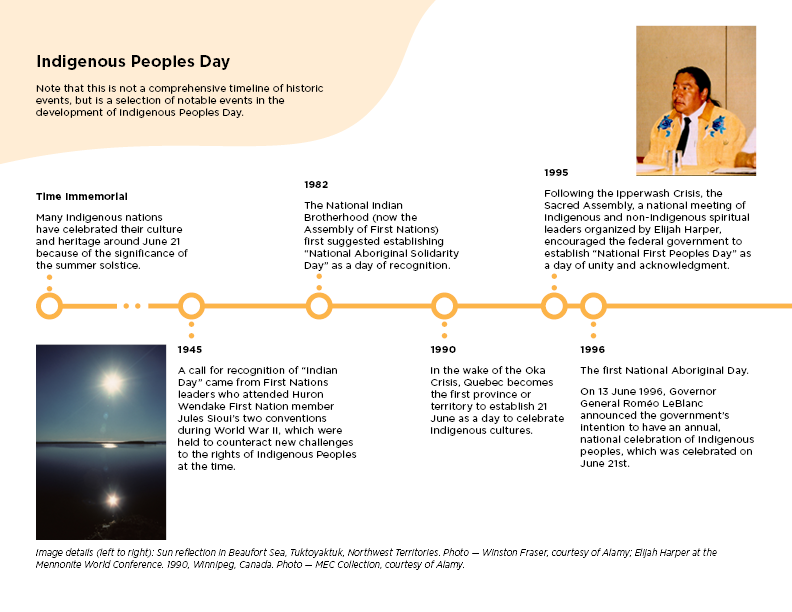Ottawa, June 21, 2023
National Indigenous Peoples’ Day
Many Indigenous nations have celebrated their culture and heritage around June 21 because of the significance of the summer solstice.

Click here to view a timeline of the history of Indigenous Peoples Day.
Sources suggest that a national day celebrating Indigenous peoples was first suggested as early as 1945. A call for recognition of “Indian Day” came from First Nations leaders who attended Huron Wendake First Nation member Jules Sioui’s two conventions during World War II, which were held to counteract new challenges to the rights of Indigenous Peoples at the time.
The Canadian Encyclopedia states that the concept of National Indigenous Peoples’ Day was first suggested in 1982, when the National Indian Brotherhood (now the Assembly of First Nations) first suggested establishing “National Aboriginal Solidarity Day” as a day of recognition.
As tensions between Indigenous and non-Indigenous communities manifested through the 90s (see Oka and Ipperwash Crises), so did proactive calls for recognition of Indigenous peoples.
On 13 June 1996, Governor General Roméo LeBlanc announced the government’s intention to have an annual, national celebration of Indigenous peoples, which was celebrated on the 21st as National Aboriginal Day.
The Canadian Federal government would later go on to endorse the United Nations Declaration on the Rights of Indigenous Peoples (UNDRIP) in 2010 and the Report of the Truth and Reconciliation Commission in 2015. Then in 2017, Prime Minister Justin Trudeau announced plans to change the name of National Aboriginal Day to National Indigenous Peoples Day, in keeping with the terms used in these important and historic documents.
The day is now marked by ceremonies and celebrations that highlight cultural performances and activities, displays of solidarity and artistry, and events that recognize the diversity of Indigenous cultures. This day is also for non-Indigenous peoples to learn about and demonstrate support for Indigenous peoples. It has been additionally bolstered by a commemorative period, Indigenous National History Month.
At the CMA, our office is located on unceded and un-surrendered Algonquin and Anishinaabe territory and will be closed on June 21. We set aside this time to enable our staff to learn more about the richness and diversities of Indigenous peoples and their cultures, as well as to reflect on the work that still needs to be done to share truth and strive to support Indigenous self-determination within the culture & heritage sector and beyond.
Disponible en français.